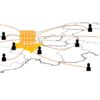Seminar Blogs

“Talk about Serendipity!” – Floor Mijland
In contrast to the previous Transmission in Motion sessions, the format for the seminar of March 31st, entitled ‘Designing for Serendipity’, was different. All participants were invited to visit an online museum curated by a few members from SILT (Subjects of Interdisciplinary Learning and Teaching). The current exhibition centered around the theme of ‘Serendipity’. A…
Read more
“Serendipity and Kairos in Humans and Machines” – Daniël Everts
The most recent Transmission in Motion seminar was somewhat different from the previous seminars. Really, it actually was not a seminar at all, but rather an online field trip to an online museum exhibition titled “Designing for Serendipity” (Domen et al. 2021), created by members of SILT (Subjects in Interdisciplinary Learning and Teaching). The museum…
Read more
“Jazz and Academia” – Hymke Theunissen
In the latest TiM seminar, “Designing for Serendipity”, the research group SILT introduced us to their self-built virtual museum, centered around the theme of Serendipity – the unexpected moment of discovery that happens when looking for something else (Darbellay et al. 2014, 2). The museum was divided into thematically curated rooms. In the green room,…
Read more
“Virtual Serendipity – An Interdisciplinary Performance of the Unexpected” – Eleonora Stacchiotti
During the sixth seminar session of Transmission in Motion series Knowledge in Making – Design by Doing, the discussion took a meta turn and researchers from the group Subjects in Interdisciplinary Learning and Teaching (SILT) have been given the floor to speak about the practice of interdisciplinary research, by exploring the potentialities of serendipitous discoveries….
Read more
“The Language of Serendipity” – Hannah Harder
The authors of “Interdisciplinary Research Boosted by Serendipity,” (2014) describe the concept of serendipity, or unplanned discovery, as productive in interdisciplinary endeavors. Allowing for serendipitous discovery is not only facilitated through an open mind, but one that has the cognitive and creative drive to draw connections between seemingly disparate events (Darbellay, Moody, Sedooka & Steffen…
Read more
“Can we Find Serendipity in Event Planning During a Pandemic?” – Polyniki Katrantsioti
Without disregarding the immense loss that the entertainment industry faced through the year 2020, it is important to note that there has been a huge leap in what live streaming services and digital technology have to offer. By using the definition Walpole gave to serendipity, as “the art of discovering things ‘by accident and sagacity…
Read more
“Science-fictionalizing Contemporary Visual Epistemologies: What Might Projection Technologies of the Future Look Like?” – Danny Steur
In “Next Slide Please,” Jennifer Eisenhauer discusses a genealogy of image projection technologies: the magic lantern, the optical lantern and the nowadays omnipresent PowerPoint (2006, 199, 211). Or, more accurately: Eisenhauer dives into the discourses surrounding, and the visual epistemologies belonging to, these projection technologies, which have shifted from magic vision (the magic lantern used…
Read more
“Phantasmagoria Aesthetics: How Knowledge, Communication, and the Spectacle Operate in the Horror Genre” – Naomi Tidball
Frank Kessler, Jamilla Notebaard, and Nico de Klerk’s presentation, enlightened seminar listeners on the history of the Magic Lantern, and how the magic lantern was a (light-)source in transmitting knowledge to students. It is also worth noting, the magic lantern’s use for the spectacle; at the end of the 18th century, phantasmagoria shows were “illuminated…
Read more
“Interactive Multi-Sensory Environments and Their Utilization in Education” – Polyniki Katrantsioti
Education and technology have been intertwined ever since the first burst of technological advancements and their dynamic entrance into the educational system. In light of the discussion held in the last Transmission in Motion seminar I would like to discuss the emergence of interactive multi-sensory environments (iMSEs) their use in primary school education, and the…
Read more
“Using Slide Shows Asks for Reconsideration” – Justyna Jakubiec
Trying to imagine studying and working without slide shows in the background might prove to turn into a highly challenging quest. That is especially valid nowadays, considering the ongoing pandemic that makes quite a significant number of people stay in their homes. Perhaps that certainty and obviousness characterizing our approach to slide shows somehow overshadow…
Read more
